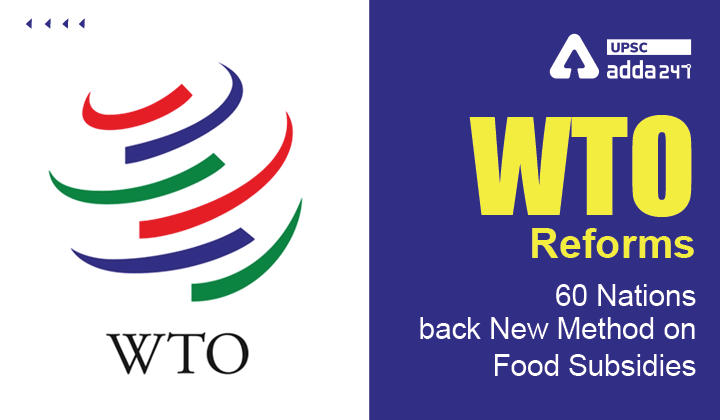Table of Contents
WTO UPSC: Relevance
- GS 3: Bilateral, regional and global groupings and agreements involving India and/or affecting India’s interests.
India and WTO: Context
- 60 developing countries have proposed a new method to calculate subsidies given to purchase, stockpile and distribute food to ensure food security for developing and poor nations.
WTO reforms: Key points
- The 60 developing country includes India, China, Pakistan, Egypt, Indonesia and South Africa.
- The G33, African Group and the ACP (African, Caribbean and Pacific) group have also recently submitted a joint proposal to the WTO for a new methodology.
- Egypt, Antigua, Nigeria, Barbados and Trinidad & Tobago too have supported the proposal, that would be discussed at the WTO in the next few days.
WTO reforms: Significance of the proposal
- The proposal comes ahead of a key ministerial meeting of the World Trade Organization (WTO) this month.
- Developing and poor countries are seeking a permanent change in the WTO’s agriculture rules to ensure policy space for their food security programmes.
WTO reforms: Recommendations
- Permanent solution for public stockholding should account for inflation
- Should be based on a recent reference price instead of an old one based on 1986-88 prices.
- Exports of food grain from public stocks should be allowed for international food aid and humanitarian purposes to the needy countries.
- A new methodology should be devised to calculate the subsidies by either accounting for excessive inflation in the External Reference Price (ERP) or calculating the ERP based on the last five years excluding the highest and the lowest entry for that product.
- ERP is the average price based on the base years 1986-88 and has not been revised for decades.
- Amend the anti-circumvention clause in the Bali Ministerial Declaration of 2013 as per which developing countries who procure food stocks for security do not distort trade or adversely affect the food security of other Members.
WTO laws: What is happening at present?
- At present, there is a peace clause which protects them from legal disputes if the subsidies breach the de minimis level (10% of the total value of production of the product) but is subject to conditions such as anti-circumvention.
Read current affairs for UPSC





 TSPSC Group 1 Question Paper 2024, Downl...
TSPSC Group 1 Question Paper 2024, Downl...
 TSPSC Group 1 Answer key 2024 Out, Downl...
TSPSC Group 1 Answer key 2024 Out, Downl...
 UPSC Prelims 2024 Question Paper, Downlo...
UPSC Prelims 2024 Question Paper, Downlo...
